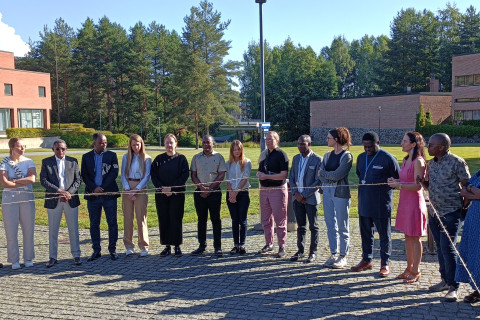More than 50 international students and teachers from nearly 20 different countries are attending the Environmental Collaboration and Conflict Resolution course on the Joensuu Campus on 12–16 August. Constituting part of the UEF Summer School, the course is offered by the environmental policy subject.
The themes of the five-day intensive course include, e.g., environmental collaboration and mediation methods related to natural resources conflicts, as well as citizen participation in the governance and protection of natural resources. Course participants will also have an opportunity to visit the municipality of Ilomantsi in Eastern Finland to learn about peatland restoration and environmental collaboration in the context of conservation and restoration projects.
“The facilitation of constructive and long-term environmental collaboration requires methodological expertise and listening skills. Collaboration and conflict resolution should be seen as a civic skill, just like first aid,” Professor of Natural Resources Governance Irmeli Mustalahti of the University of Eastern Finland says.
Besides Master’s and doctoral level students, representatives of environmental organisations, the private sector, and various ministries from, e.g., Finland and Somalia, are also attending the course. The course focuses on concrete ways to prevent conflicts between different actors and introduces various collaborative and participatory methods, and their application, in environmental collaboration.
“A collaborative approach to natural resources governance, one that addresses environmental, economic and social needs, is essential for building sustainable and long-term solutions. Such an approach must be promoted on international forums and at a national level. However, it is equally important to act locally since many environmental conflicts are local by nature. Training opportunities, such as the course we are currently attending, can help develop the expertise needed to advance collaboration at all these levels,” notes Director of Research Ubaldus Tumaini of College of Business Education (CBE) in Tanzania.
The course constitutes part of the Environmental Collaboration and Conflict Resolution module, which is coordinated by the University of Eastern Finland and funded by the EDUCase network supported by the Finnish Ministry of Education and Culture. The project promotes collaboration in the field of environmental collaboration and environmental conflict resolution between higher education institutions in Finland and the Global South. The project is led by the University of Eastern Finland and training is offered in association with Portland State University in the US, the College of Business Education (CBE) in Tanzania, and the UNESCO Network of Biosphere Reserves, which in Finland include the biosphere reserves of North Karelia and the Archipelago Sea.
The next Environmental Collaboration and Conflict Resolution course will be held in Indonesia in autumn 2025, and the ECCR Network is also developing online training.
For further information, please contact:
Professor Irmeli Mustalahti, tel. +358 50 563 2071, irmeli.mustalahti(at)uef.fi
Environmental Collaboration and Conflict Resolution (ECCR) Network
University of Eastern Finland Research Group on Responsive Natural Resources Governance
